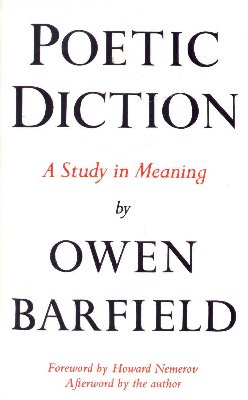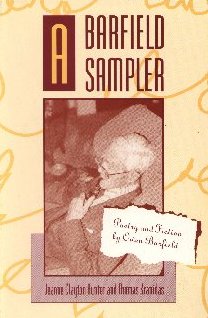

| Poetry |
For Barfield "great poetry" may be defined as "the progressive incarnation of life in consciousness" (PD 181).
This concise definition and highly poetic description of poetry appear on Poetic Diction's final page, the product of a book-length dialectical investigation into poetry's meaning. Poetic Diction, and his other writings as well, offer numerous postulates about poetry which lay the groundwork for Barfield's conclusion.Over the perpetual evolution of human consciousness, which is stamping itself upon the transformation of language, the spirit of poetry hovers, for ever unable to alight. It is only when we are lifted above that transformation, so that we behold it as present movement, that our startled souls feel the little pat and the throbbing feathery warmth, which tell us that she has perched. It is only when we have risen from beholding the creature into beholding creation that our mortality catches for a moment the music of the turning spheres. (PD 181)
- [Poetry is always] something more than the signs or sounds by which it is conveyed. (41)
- [Poetry] exists primarily in the world of consciousness. (41)
- The question of whether or no I can call a given group of words "poetry" is, in fact, immediately dependent on my own inner experiences. (42)
- [It is possible for a group of words to] be unpoetic to the consciousness which originates it, but poetic to the consciousness which receives or contemplates it. (49)
- Although the poetic principle in language has waned since Homer's day, poetry as inner experience has increased. The light of conscious poetry which can irradiate a modern imagination, as it comes into contact with, say, the Homeric hexameters, is not to be compared with such fitful aesthetic gleams as must indeed have flared up now and again amidst the host of grosser pleasures preoccupying the dim-self consciousness of his own (probably half-intoxicated) audience. (105-106)
- In general in the language of poetry the perceptual element is proportionally higher than in prose; while in prose the intellectual element predominates over the perceptual. (HGH 23)
- I cannot find any more profundity in the proposition that "a poem must not mean but be" than I could in the proposition, say, that "a satellite must not orbit, but stop still." (RM 132)2
The situation of the modern poet, working by imagination rather than inspiration, is, of course, entirely different.are, in their infancy, metrical, that is to say based on a more or less regularly recurring rhythm. Thus, unless we wish to indulge all sorts of fanciful and highly "logomorphic" notions, we are obliged to assume that the earliest verse-rhythms were "given" by Nature in the same way as the earliest "meaning." And this is comprehensible enough. Nature herself is perpetually rhythmic. Just as the myths still live on a ghostly life as fables after they have died as real meaning, so the old rhythmic human consciousness of Nature (it should rather be called a participation than a consciousness) lives on as the tradition of metrical form. We can only understand the origin of metre as going back to the age when men were conscious, not merely in their own heads, but in the beating of their hearts and the pulsing of their blood--when thinking was not merely of Nature, but was Nature herself. (PD 146-47)
The modern poet is in some sense . . . in the position of having to fight against words, whereas the primitive bard was carried forward on their meanings like Arion on the Dolphin's back. Where then does the modern poet find again the poetic principle that is dying out of language? Where? Nowhere but in himself. The same creative activity, once operative in meaning without man's knowledge or control, and only recognized long afterwards, when he awoke to contemplate, as it were, what he had written in his sleep, this is now to be found within his own consciousness, and it calls him to become the true creator, the maker of meaning itself. (PD 107)
| See in particular Poetic Diction, passim, "Poetic Diction and Legal Fiction" (RM 44-64). |
| 1"When I speak of the poetic," Barfield reminds in Poetic Diction, "I mean what many people would prefer to call the 'creative'" (105). |
| 2Barfield has in mind Archibald MacLeish's famous dictum in his poem "Ars Poetica." |